A Comprehensive Report on Unemployment, Stress, and Depression
VerifiedAdded on 2023/04/21
|14
|3737
|487
Report
AI Summary
This report investigates the relationship between unemployment and mental health, focusing on the prevalence of stress and depression among unemployed individuals in the UK. The study explores the causes, symptoms, and available treatments for these conditions, utilizing both qualitative and quantitative data collected through questionnaires from 20 respondents. The research highlights the impact of unemployment on various aspects of life, including emotional well-being, social connections, and financial stability. The report also discusses the role of cognitive behavioral therapy and medication in managing stress and depression, as well as practical steps individuals can take to mitigate the negative effects of job loss. Ultimately, the study aims to provide a comprehensive understanding of the mental health challenges associated with unemployment and to offer insights into effective strategies for support and recovery. This report is available on Desklib, a platform offering a wide range of academic resources for students.
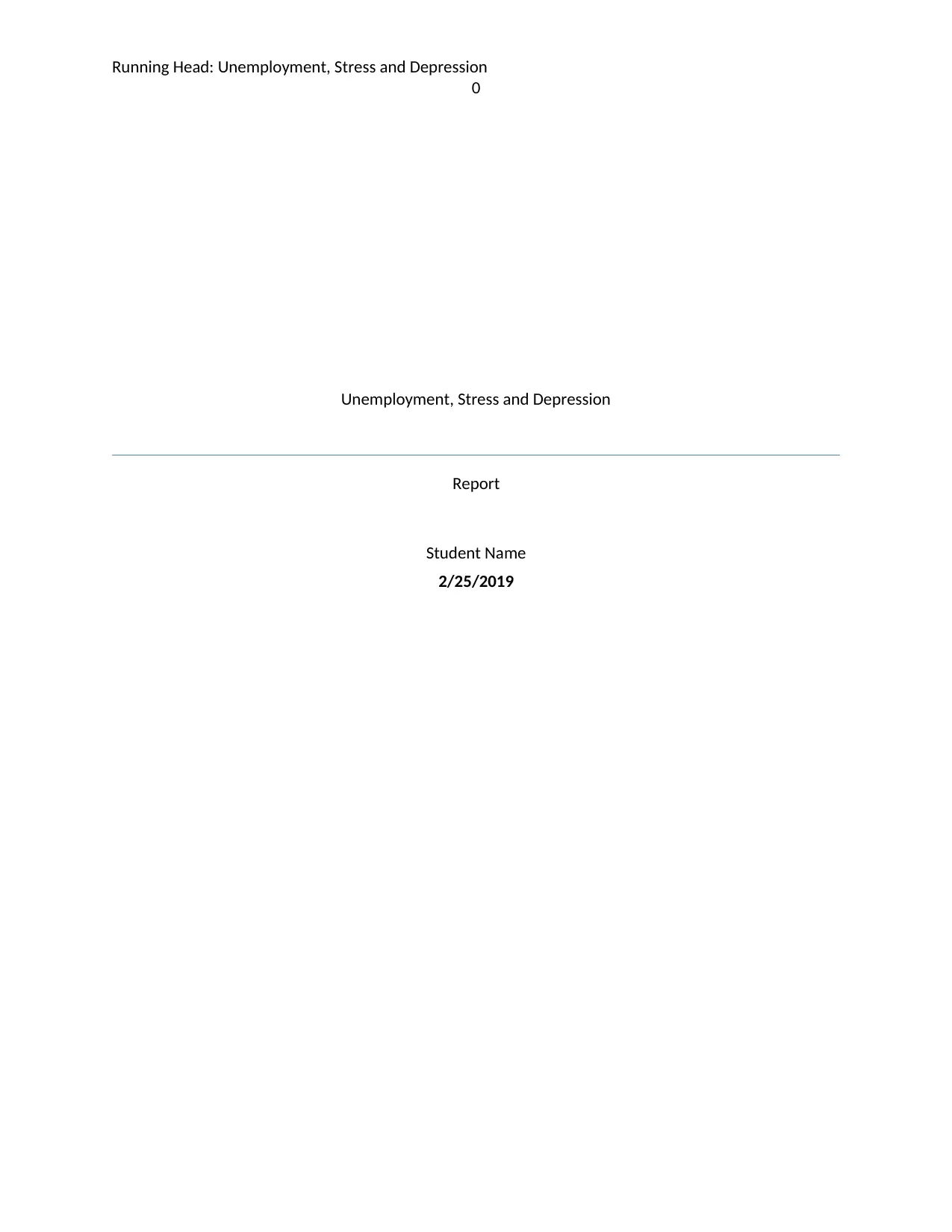
Running Head: Unemployment, Stress and Depression
0
Unemployment, Stress and Depression
Report
Student Name
2/25/2019
0
Unemployment, Stress and Depression
Report
Student Name
2/25/2019
Paraphrase This Document
Need a fresh take? Get an instant paraphrase of this document with our AI Paraphraser
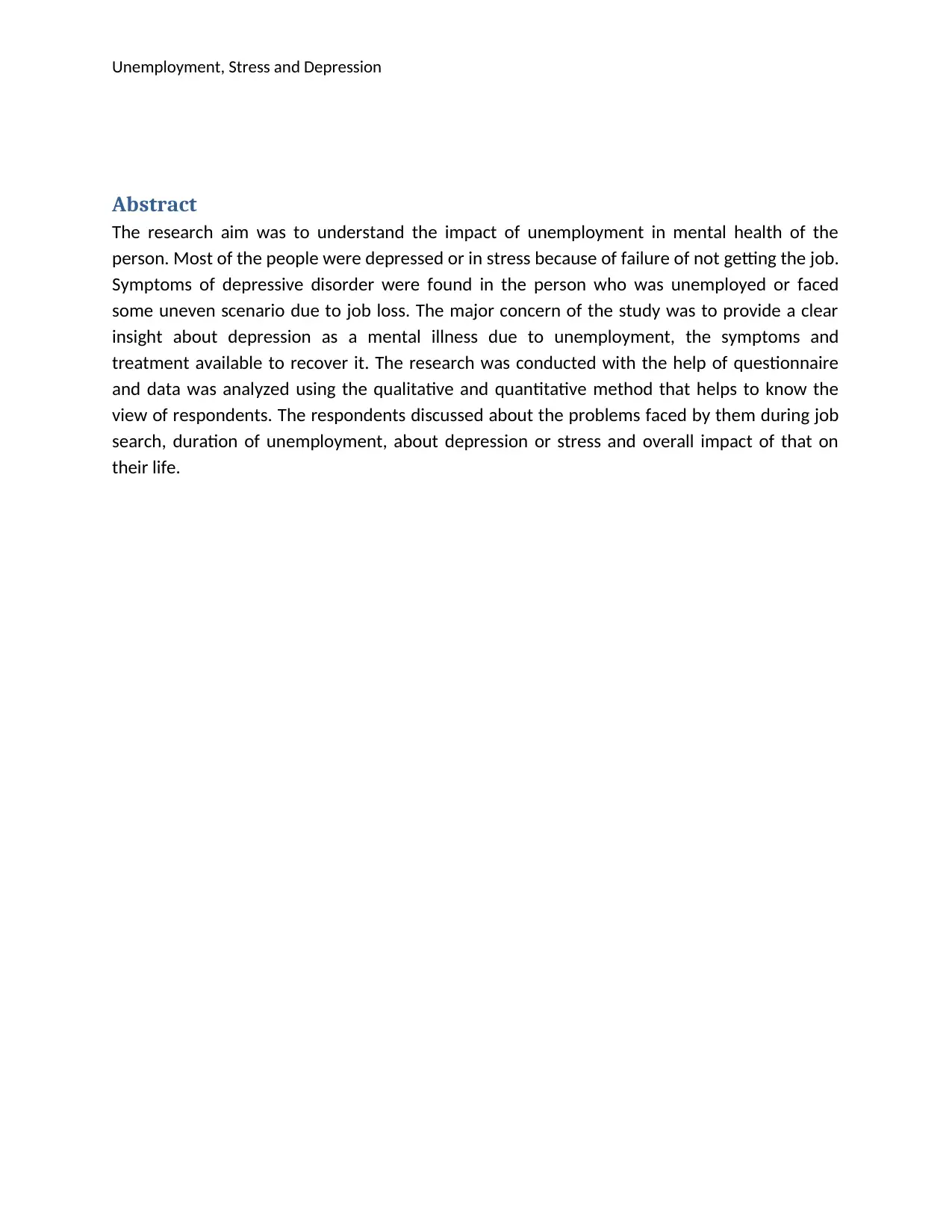
Unemployment, Stress and Depression
Abstract
The research aim was to understand the impact of unemployment in mental health of the
person. Most of the people were depressed or in stress because of failure of not getting the job.
Symptoms of depressive disorder were found in the person who was unemployed or faced
some uneven scenario due to job loss. The major concern of the study was to provide a clear
insight about depression as a mental illness due to unemployment, the symptoms and
treatment available to recover it. The research was conducted with the help of questionnaire
and data was analyzed using the qualitative and quantitative method that helps to know the
view of respondents. The respondents discussed about the problems faced by them during job
search, duration of unemployment, about depression or stress and overall impact of that on
their life.
Abstract
The research aim was to understand the impact of unemployment in mental health of the
person. Most of the people were depressed or in stress because of failure of not getting the job.
Symptoms of depressive disorder were found in the person who was unemployed or faced
some uneven scenario due to job loss. The major concern of the study was to provide a clear
insight about depression as a mental illness due to unemployment, the symptoms and
treatment available to recover it. The research was conducted with the help of questionnaire
and data was analyzed using the qualitative and quantitative method that helps to know the
view of respondents. The respondents discussed about the problems faced by them during job
search, duration of unemployment, about depression or stress and overall impact of that on
their life.
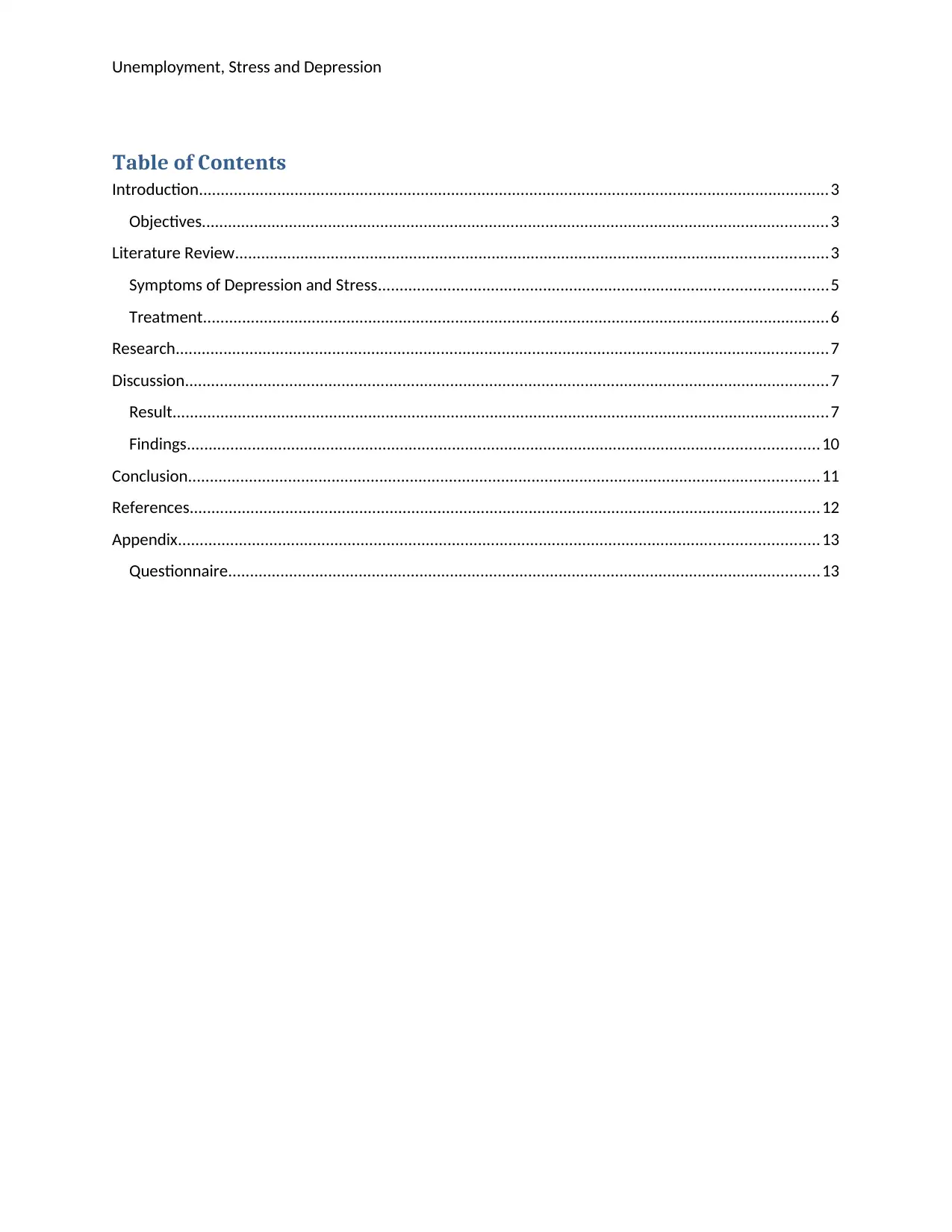
Unemployment, Stress and Depression
Table of Contents
Introduction.................................................................................................................................................3
Objectives................................................................................................................................................3
Literature Review........................................................................................................................................3
Symptoms of Depression and Stress.......................................................................................................5
Treatment................................................................................................................................................6
Research......................................................................................................................................................7
Discussion....................................................................................................................................................7
Result.......................................................................................................................................................7
Findings.................................................................................................................................................10
Conclusion.................................................................................................................................................11
References.................................................................................................................................................12
Appendix...................................................................................................................................................13
Questionnaire........................................................................................................................................13
Table of Contents
Introduction.................................................................................................................................................3
Objectives................................................................................................................................................3
Literature Review........................................................................................................................................3
Symptoms of Depression and Stress.......................................................................................................5
Treatment................................................................................................................................................6
Research......................................................................................................................................................7
Discussion....................................................................................................................................................7
Result.......................................................................................................................................................7
Findings.................................................................................................................................................10
Conclusion.................................................................................................................................................11
References.................................................................................................................................................12
Appendix...................................................................................................................................................13
Questionnaire........................................................................................................................................13
⊘ This is a preview!⊘
Do you want full access?
Subscribe today to unlock all pages.

Trusted by 1+ million students worldwide
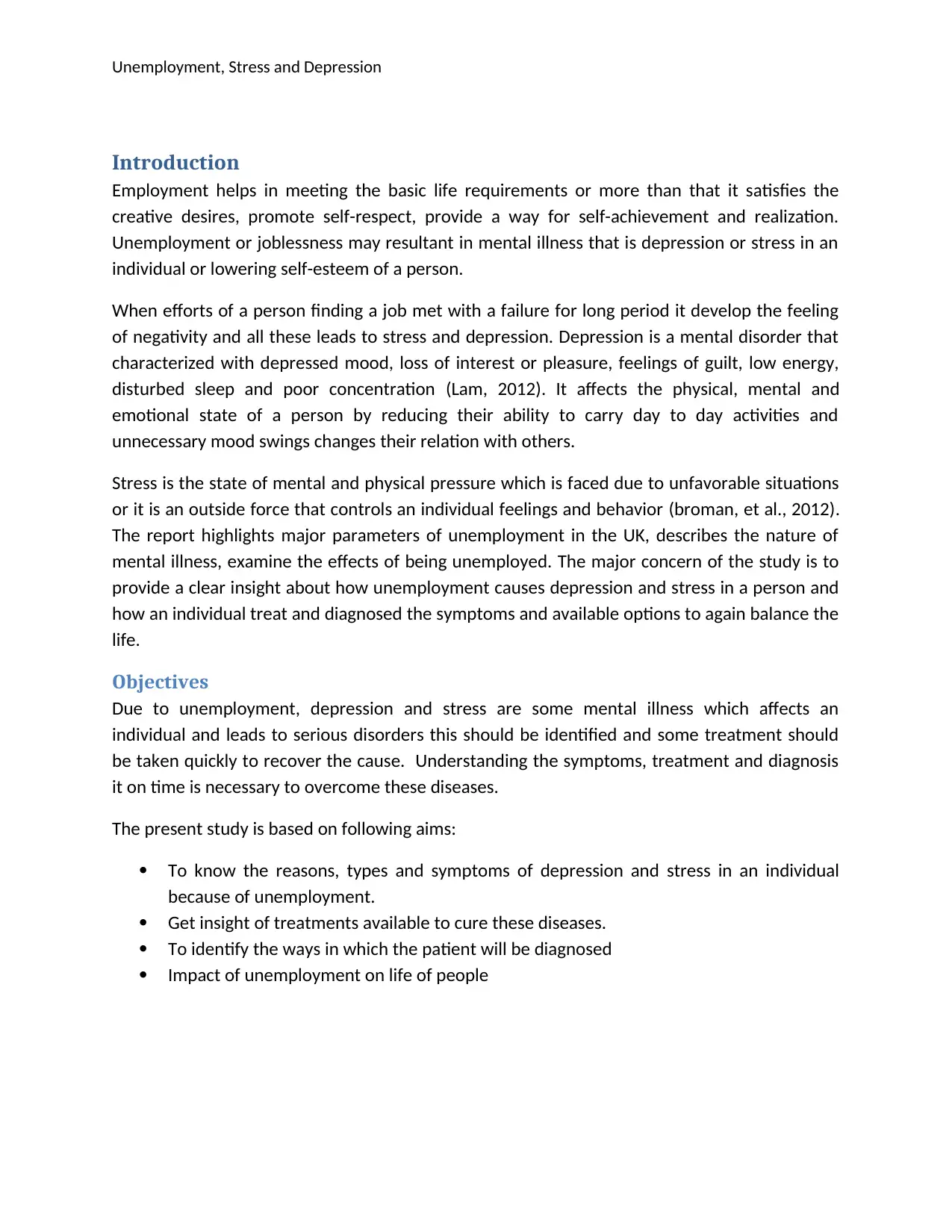
Unemployment, Stress and Depression
Introduction
Employment helps in meeting the basic life requirements or more than that it satisfies the
creative desires, promote self-respect, provide a way for self-achievement and realization.
Unemployment or joblessness may resultant in mental illness that is depression or stress in an
individual or lowering self-esteem of a person.
When efforts of a person finding a job met with a failure for long period it develop the feeling
of negativity and all these leads to stress and depression. Depression is a mental disorder that
characterized with depressed mood, loss of interest or pleasure, feelings of guilt, low energy,
disturbed sleep and poor concentration (Lam, 2012). It affects the physical, mental and
emotional state of a person by reducing their ability to carry day to day activities and
unnecessary mood swings changes their relation with others.
Stress is the state of mental and physical pressure which is faced due to unfavorable situations
or it is an outside force that controls an individual feelings and behavior (broman, et al., 2012).
The report highlights major parameters of unemployment in the UK, describes the nature of
mental illness, examine the effects of being unemployed. The major concern of the study is to
provide a clear insight about how unemployment causes depression and stress in a person and
how an individual treat and diagnosed the symptoms and available options to again balance the
life.
Objectives
Due to unemployment, depression and stress are some mental illness which affects an
individual and leads to serious disorders this should be identified and some treatment should
be taken quickly to recover the cause. Understanding the symptoms, treatment and diagnosis
it on time is necessary to overcome these diseases.
The present study is based on following aims:
To know the reasons, types and symptoms of depression and stress in an individual
because of unemployment.
Get insight of treatments available to cure these diseases.
To identify the ways in which the patient will be diagnosed
Impact of unemployment on life of people
Introduction
Employment helps in meeting the basic life requirements or more than that it satisfies the
creative desires, promote self-respect, provide a way for self-achievement and realization.
Unemployment or joblessness may resultant in mental illness that is depression or stress in an
individual or lowering self-esteem of a person.
When efforts of a person finding a job met with a failure for long period it develop the feeling
of negativity and all these leads to stress and depression. Depression is a mental disorder that
characterized with depressed mood, loss of interest or pleasure, feelings of guilt, low energy,
disturbed sleep and poor concentration (Lam, 2012). It affects the physical, mental and
emotional state of a person by reducing their ability to carry day to day activities and
unnecessary mood swings changes their relation with others.
Stress is the state of mental and physical pressure which is faced due to unfavorable situations
or it is an outside force that controls an individual feelings and behavior (broman, et al., 2012).
The report highlights major parameters of unemployment in the UK, describes the nature of
mental illness, examine the effects of being unemployed. The major concern of the study is to
provide a clear insight about how unemployment causes depression and stress in a person and
how an individual treat and diagnosed the symptoms and available options to again balance the
life.
Objectives
Due to unemployment, depression and stress are some mental illness which affects an
individual and leads to serious disorders this should be identified and some treatment should
be taken quickly to recover the cause. Understanding the symptoms, treatment and diagnosis
it on time is necessary to overcome these diseases.
The present study is based on following aims:
To know the reasons, types and symptoms of depression and stress in an individual
because of unemployment.
Get insight of treatments available to cure these diseases.
To identify the ways in which the patient will be diagnosed
Impact of unemployment on life of people
Paraphrase This Document
Need a fresh take? Get an instant paraphrase of this document with our AI Paraphraser
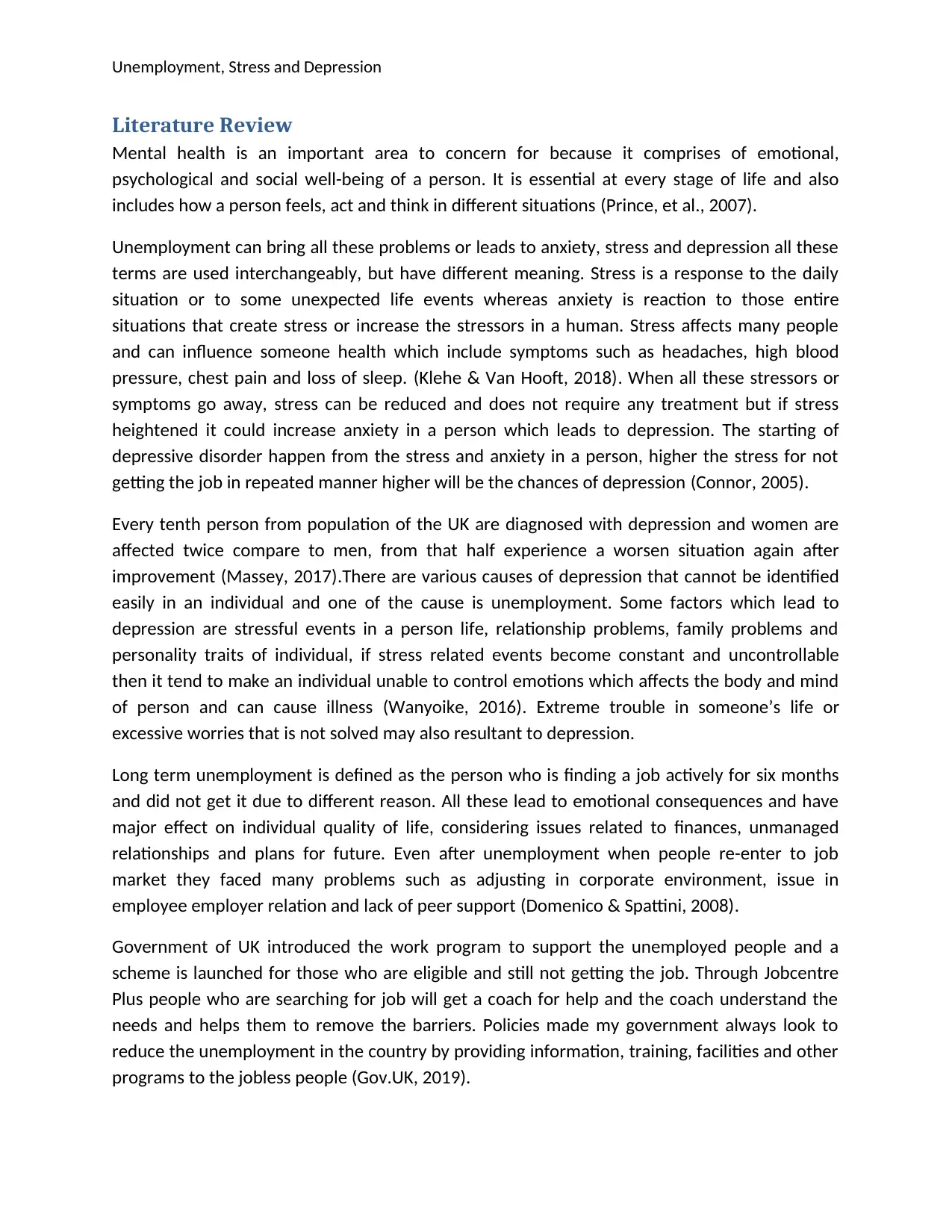
Unemployment, Stress and Depression
Literature Review
Mental health is an important area to concern for because it comprises of emotional,
psychological and social well-being of a person. It is essential at every stage of life and also
includes how a person feels, act and think in different situations (Prince, et al., 2007).
Unemployment can bring all these problems or leads to anxiety, stress and depression all these
terms are used interchangeably, but have different meaning. Stress is a response to the daily
situation or to some unexpected life events whereas anxiety is reaction to those entire
situations that create stress or increase the stressors in a human. Stress affects many people
and can influence someone health which include symptoms such as headaches, high blood
pressure, chest pain and loss of sleep. (Klehe & Van Hooft, 2018). When all these stressors or
symptoms go away, stress can be reduced and does not require any treatment but if stress
heightened it could increase anxiety in a person which leads to depression. The starting of
depressive disorder happen from the stress and anxiety in a person, higher the stress for not
getting the job in repeated manner higher will be the chances of depression (Connor, 2005).
Every tenth person from population of the UK are diagnosed with depression and women are
affected twice compare to men, from that half experience a worsen situation again after
improvement (Massey, 2017).There are various causes of depression that cannot be identified
easily in an individual and one of the cause is unemployment. Some factors which lead to
depression are stressful events in a person life, relationship problems, family problems and
personality traits of individual, if stress related events become constant and uncontrollable
then it tend to make an individual unable to control emotions which affects the body and mind
of person and can cause illness (Wanyoike, 2016). Extreme trouble in someone’s life or
excessive worries that is not solved may also resultant to depression.
Long term unemployment is defined as the person who is finding a job actively for six months
and did not get it due to different reason. All these lead to emotional consequences and have
major effect on individual quality of life, considering issues related to finances, unmanaged
relationships and plans for future. Even after unemployment when people re-enter to job
market they faced many problems such as adjusting in corporate environment, issue in
employee employer relation and lack of peer support (Domenico & Spattini, 2008).
Government of UK introduced the work program to support the unemployed people and a
scheme is launched for those who are eligible and still not getting the job. Through Jobcentre
Plus people who are searching for job will get a coach for help and the coach understand the
needs and helps them to remove the barriers. Policies made my government always look to
reduce the unemployment in the country by providing information, training, facilities and other
programs to the jobless people (Gov.UK, 2019).
Literature Review
Mental health is an important area to concern for because it comprises of emotional,
psychological and social well-being of a person. It is essential at every stage of life and also
includes how a person feels, act and think in different situations (Prince, et al., 2007).
Unemployment can bring all these problems or leads to anxiety, stress and depression all these
terms are used interchangeably, but have different meaning. Stress is a response to the daily
situation or to some unexpected life events whereas anxiety is reaction to those entire
situations that create stress or increase the stressors in a human. Stress affects many people
and can influence someone health which include symptoms such as headaches, high blood
pressure, chest pain and loss of sleep. (Klehe & Van Hooft, 2018). When all these stressors or
symptoms go away, stress can be reduced and does not require any treatment but if stress
heightened it could increase anxiety in a person which leads to depression. The starting of
depressive disorder happen from the stress and anxiety in a person, higher the stress for not
getting the job in repeated manner higher will be the chances of depression (Connor, 2005).
Every tenth person from population of the UK are diagnosed with depression and women are
affected twice compare to men, from that half experience a worsen situation again after
improvement (Massey, 2017).There are various causes of depression that cannot be identified
easily in an individual and one of the cause is unemployment. Some factors which lead to
depression are stressful events in a person life, relationship problems, family problems and
personality traits of individual, if stress related events become constant and uncontrollable
then it tend to make an individual unable to control emotions which affects the body and mind
of person and can cause illness (Wanyoike, 2016). Extreme trouble in someone’s life or
excessive worries that is not solved may also resultant to depression.
Long term unemployment is defined as the person who is finding a job actively for six months
and did not get it due to different reason. All these lead to emotional consequences and have
major effect on individual quality of life, considering issues related to finances, unmanaged
relationships and plans for future. Even after unemployment when people re-enter to job
market they faced many problems such as adjusting in corporate environment, issue in
employee employer relation and lack of peer support (Domenico & Spattini, 2008).
Government of UK introduced the work program to support the unemployed people and a
scheme is launched for those who are eligible and still not getting the job. Through Jobcentre
Plus people who are searching for job will get a coach for help and the coach understand the
needs and helps them to remove the barriers. Policies made my government always look to
reduce the unemployment in the country by providing information, training, facilities and other
programs to the jobless people (Gov.UK, 2019).
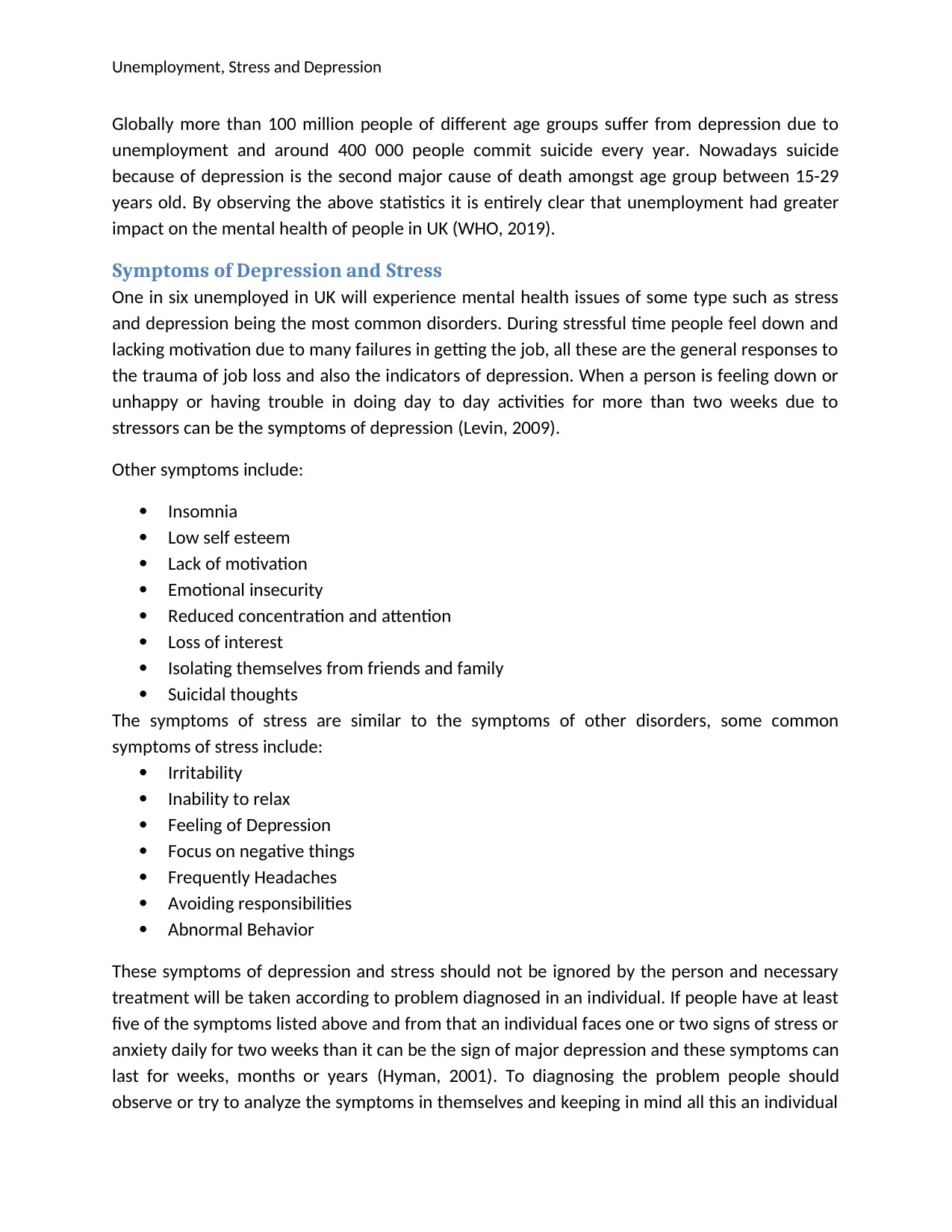
Unemployment, Stress and Depression
Globally more than 100 million people of different age groups suffer from depression due to
unemployment and around 400 000 people commit suicide every year. Nowadays suicide
because of depression is the second major cause of death amongst age group between 15-29
years old. By observing the above statistics it is entirely clear that unemployment had greater
impact on the mental health of people in UK (WHO, 2019).
Symptoms of Depression and Stress
One in six unemployed in UK will experience mental health issues of some type such as stress
and depression being the most common disorders. During stressful time people feel down and
lacking motivation due to many failures in getting the job, all these are the general responses to
the trauma of job loss and also the indicators of depression. When a person is feeling down or
unhappy or having trouble in doing day to day activities for more than two weeks due to
stressors can be the symptoms of depression (Levin, 2009).
Other symptoms include:
Insomnia
Low self esteem
Lack of motivation
Emotional insecurity
Reduced concentration and attention
Loss of interest
Isolating themselves from friends and family
Suicidal thoughts
The symptoms of stress are similar to the symptoms of other disorders, some common
symptoms of stress include:
Irritability
Inability to relax
Feeling of Depression
Focus on negative things
Frequently Headaches
Avoiding responsibilities
Abnormal Behavior
These symptoms of depression and stress should not be ignored by the person and necessary
treatment will be taken according to problem diagnosed in an individual. If people have at least
five of the symptoms listed above and from that an individual faces one or two signs of stress or
anxiety daily for two weeks than it can be the sign of major depression and these symptoms can
last for weeks, months or years (Hyman, 2001). To diagnosing the problem people should
observe or try to analyze the symptoms in themselves and keeping in mind all this an individual
Globally more than 100 million people of different age groups suffer from depression due to
unemployment and around 400 000 people commit suicide every year. Nowadays suicide
because of depression is the second major cause of death amongst age group between 15-29
years old. By observing the above statistics it is entirely clear that unemployment had greater
impact on the mental health of people in UK (WHO, 2019).
Symptoms of Depression and Stress
One in six unemployed in UK will experience mental health issues of some type such as stress
and depression being the most common disorders. During stressful time people feel down and
lacking motivation due to many failures in getting the job, all these are the general responses to
the trauma of job loss and also the indicators of depression. When a person is feeling down or
unhappy or having trouble in doing day to day activities for more than two weeks due to
stressors can be the symptoms of depression (Levin, 2009).
Other symptoms include:
Insomnia
Low self esteem
Lack of motivation
Emotional insecurity
Reduced concentration and attention
Loss of interest
Isolating themselves from friends and family
Suicidal thoughts
The symptoms of stress are similar to the symptoms of other disorders, some common
symptoms of stress include:
Irritability
Inability to relax
Feeling of Depression
Focus on negative things
Frequently Headaches
Avoiding responsibilities
Abnormal Behavior
These symptoms of depression and stress should not be ignored by the person and necessary
treatment will be taken according to problem diagnosed in an individual. If people have at least
five of the symptoms listed above and from that an individual faces one or two signs of stress or
anxiety daily for two weeks than it can be the sign of major depression and these symptoms can
last for weeks, months or years (Hyman, 2001). To diagnosing the problem people should
observe or try to analyze the symptoms in themselves and keeping in mind all this an individual
⊘ This is a preview!⊘
Do you want full access?
Subscribe today to unlock all pages.

Trusted by 1+ million students worldwide
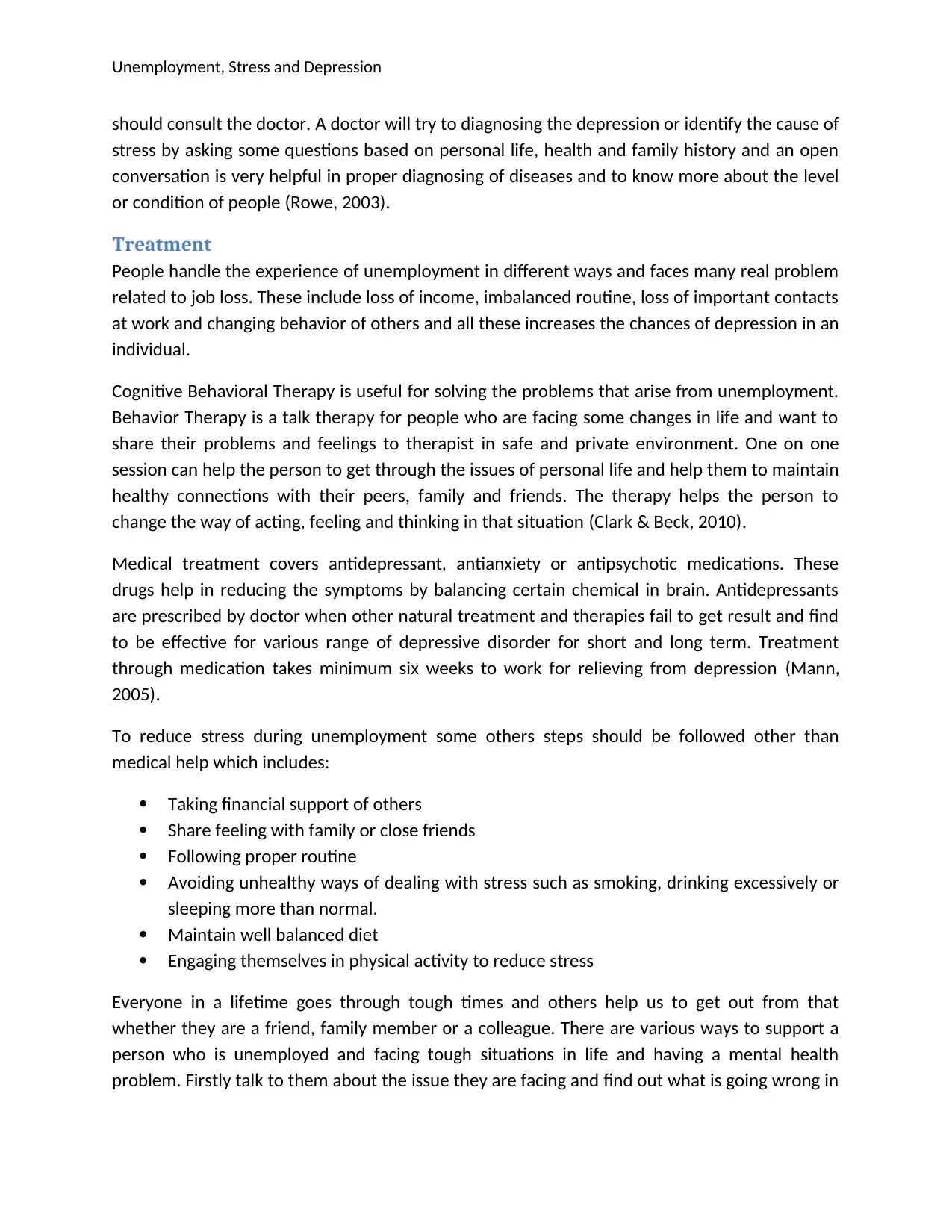
Unemployment, Stress and Depression
should consult the doctor. A doctor will try to diagnosing the depression or identify the cause of
stress by asking some questions based on personal life, health and family history and an open
conversation is very helpful in proper diagnosing of diseases and to know more about the level
or condition of people (Rowe, 2003).
Treatment
People handle the experience of unemployment in different ways and faces many real problem
related to job loss. These include loss of income, imbalanced routine, loss of important contacts
at work and changing behavior of others and all these increases the chances of depression in an
individual.
Cognitive Behavioral Therapy is useful for solving the problems that arise from unemployment.
Behavior Therapy is a talk therapy for people who are facing some changes in life and want to
share their problems and feelings to therapist in safe and private environment. One on one
session can help the person to get through the issues of personal life and help them to maintain
healthy connections with their peers, family and friends. The therapy helps the person to
change the way of acting, feeling and thinking in that situation (Clark & Beck, 2010).
Medical treatment covers antidepressant, antianxiety or antipsychotic medications. These
drugs help in reducing the symptoms by balancing certain chemical in brain. Antidepressants
are prescribed by doctor when other natural treatment and therapies fail to get result and find
to be effective for various range of depressive disorder for short and long term. Treatment
through medication takes minimum six weeks to work for relieving from depression (Mann,
2005).
To reduce stress during unemployment some others steps should be followed other than
medical help which includes:
Taking financial support of others
Share feeling with family or close friends
Following proper routine
Avoiding unhealthy ways of dealing with stress such as smoking, drinking excessively or
sleeping more than normal.
Maintain well balanced diet
Engaging themselves in physical activity to reduce stress
Everyone in a lifetime goes through tough times and others help us to get out from that
whether they are a friend, family member or a colleague. There are various ways to support a
person who is unemployed and facing tough situations in life and having a mental health
problem. Firstly talk to them about the issue they are facing and find out what is going wrong in
should consult the doctor. A doctor will try to diagnosing the depression or identify the cause of
stress by asking some questions based on personal life, health and family history and an open
conversation is very helpful in proper diagnosing of diseases and to know more about the level
or condition of people (Rowe, 2003).
Treatment
People handle the experience of unemployment in different ways and faces many real problem
related to job loss. These include loss of income, imbalanced routine, loss of important contacts
at work and changing behavior of others and all these increases the chances of depression in an
individual.
Cognitive Behavioral Therapy is useful for solving the problems that arise from unemployment.
Behavior Therapy is a talk therapy for people who are facing some changes in life and want to
share their problems and feelings to therapist in safe and private environment. One on one
session can help the person to get through the issues of personal life and help them to maintain
healthy connections with their peers, family and friends. The therapy helps the person to
change the way of acting, feeling and thinking in that situation (Clark & Beck, 2010).
Medical treatment covers antidepressant, antianxiety or antipsychotic medications. These
drugs help in reducing the symptoms by balancing certain chemical in brain. Antidepressants
are prescribed by doctor when other natural treatment and therapies fail to get result and find
to be effective for various range of depressive disorder for short and long term. Treatment
through medication takes minimum six weeks to work for relieving from depression (Mann,
2005).
To reduce stress during unemployment some others steps should be followed other than
medical help which includes:
Taking financial support of others
Share feeling with family or close friends
Following proper routine
Avoiding unhealthy ways of dealing with stress such as smoking, drinking excessively or
sleeping more than normal.
Maintain well balanced diet
Engaging themselves in physical activity to reduce stress
Everyone in a lifetime goes through tough times and others help us to get out from that
whether they are a friend, family member or a colleague. There are various ways to support a
person who is unemployed and facing tough situations in life and having a mental health
problem. Firstly talk to them about the issue they are facing and find out what is going wrong in
Paraphrase This Document
Need a fresh take? Get an instant paraphrase of this document with our AI Paraphraser
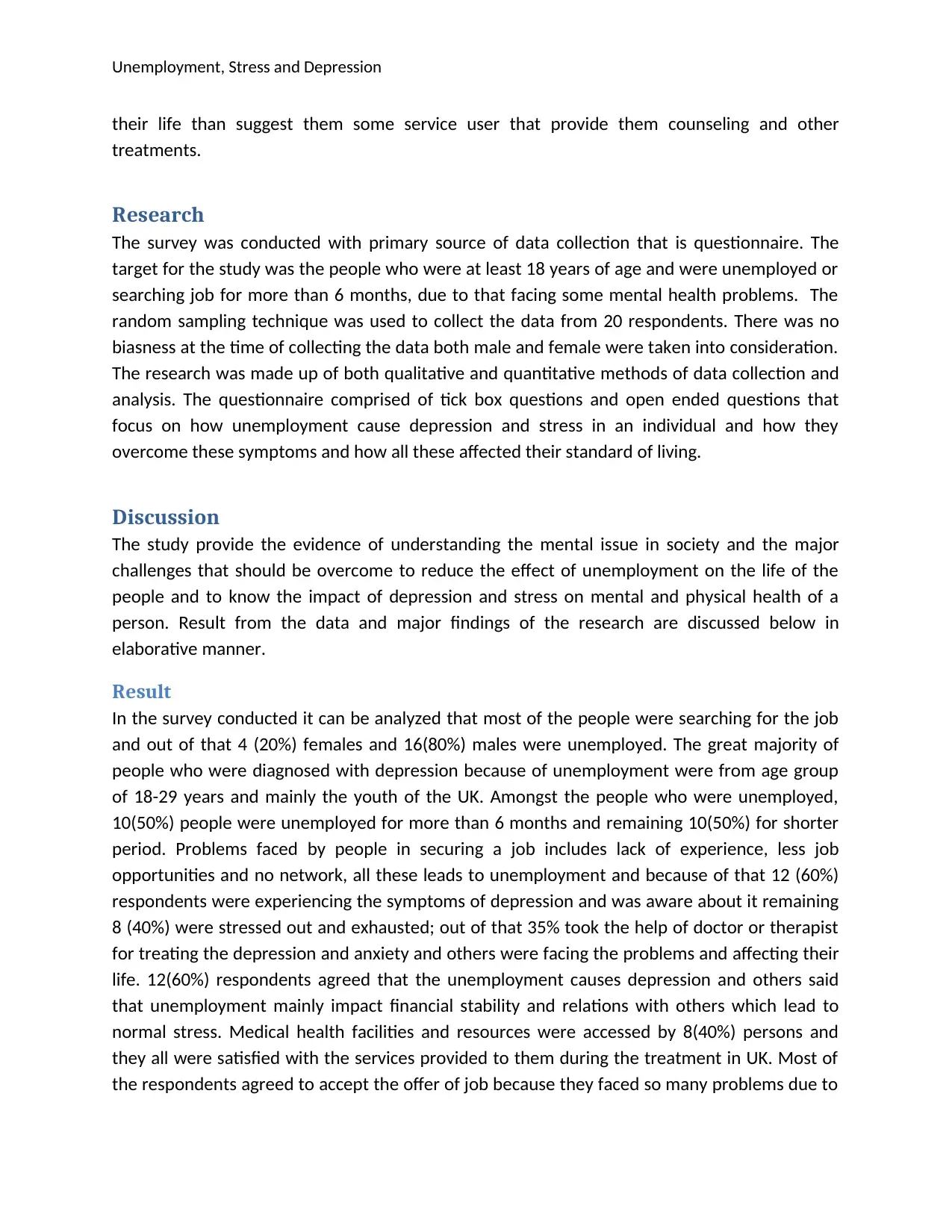
Unemployment, Stress and Depression
their life than suggest them some service user that provide them counseling and other
treatments.
Research
The survey was conducted with primary source of data collection that is questionnaire. The
target for the study was the people who were at least 18 years of age and were unemployed or
searching job for more than 6 months, due to that facing some mental health problems. The
random sampling technique was used to collect the data from 20 respondents. There was no
biasness at the time of collecting the data both male and female were taken into consideration.
The research was made up of both qualitative and quantitative methods of data collection and
analysis. The questionnaire comprised of tick box questions and open ended questions that
focus on how unemployment cause depression and stress in an individual and how they
overcome these symptoms and how all these affected their standard of living.
Discussion
The study provide the evidence of understanding the mental issue in society and the major
challenges that should be overcome to reduce the effect of unemployment on the life of the
people and to know the impact of depression and stress on mental and physical health of a
person. Result from the data and major findings of the research are discussed below in
elaborative manner.
Result
In the survey conducted it can be analyzed that most of the people were searching for the job
and out of that 4 (20%) females and 16(80%) males were unemployed. The great majority of
people who were diagnosed with depression because of unemployment were from age group
of 18-29 years and mainly the youth of the UK. Amongst the people who were unemployed,
10(50%) people were unemployed for more than 6 months and remaining 10(50%) for shorter
period. Problems faced by people in securing a job includes lack of experience, less job
opportunities and no network, all these leads to unemployment and because of that 12 (60%)
respondents were experiencing the symptoms of depression and was aware about it remaining
8 (40%) were stressed out and exhausted; out of that 35% took the help of doctor or therapist
for treating the depression and anxiety and others were facing the problems and affecting their
life. 12(60%) respondents agreed that the unemployment causes depression and others said
that unemployment mainly impact financial stability and relations with others which lead to
normal stress. Medical health facilities and resources were accessed by 8(40%) persons and
they all were satisfied with the services provided to them during the treatment in UK. Most of
the respondents agreed to accept the offer of job because they faced so many problems due to
their life than suggest them some service user that provide them counseling and other
treatments.
Research
The survey was conducted with primary source of data collection that is questionnaire. The
target for the study was the people who were at least 18 years of age and were unemployed or
searching job for more than 6 months, due to that facing some mental health problems. The
random sampling technique was used to collect the data from 20 respondents. There was no
biasness at the time of collecting the data both male and female were taken into consideration.
The research was made up of both qualitative and quantitative methods of data collection and
analysis. The questionnaire comprised of tick box questions and open ended questions that
focus on how unemployment cause depression and stress in an individual and how they
overcome these symptoms and how all these affected their standard of living.
Discussion
The study provide the evidence of understanding the mental issue in society and the major
challenges that should be overcome to reduce the effect of unemployment on the life of the
people and to know the impact of depression and stress on mental and physical health of a
person. Result from the data and major findings of the research are discussed below in
elaborative manner.
Result
In the survey conducted it can be analyzed that most of the people were searching for the job
and out of that 4 (20%) females and 16(80%) males were unemployed. The great majority of
people who were diagnosed with depression because of unemployment were from age group
of 18-29 years and mainly the youth of the UK. Amongst the people who were unemployed,
10(50%) people were unemployed for more than 6 months and remaining 10(50%) for shorter
period. Problems faced by people in securing a job includes lack of experience, less job
opportunities and no network, all these leads to unemployment and because of that 12 (60%)
respondents were experiencing the symptoms of depression and was aware about it remaining
8 (40%) were stressed out and exhausted; out of that 35% took the help of doctor or therapist
for treating the depression and anxiety and others were facing the problems and affecting their
life. 12(60%) respondents agreed that the unemployment causes depression and others said
that unemployment mainly impact financial stability and relations with others which lead to
normal stress. Medical health facilities and resources were accessed by 8(40%) persons and
they all were satisfied with the services provided to them during the treatment in UK. Most of
the respondents agreed to accept the offer of job because they faced so many problems due to
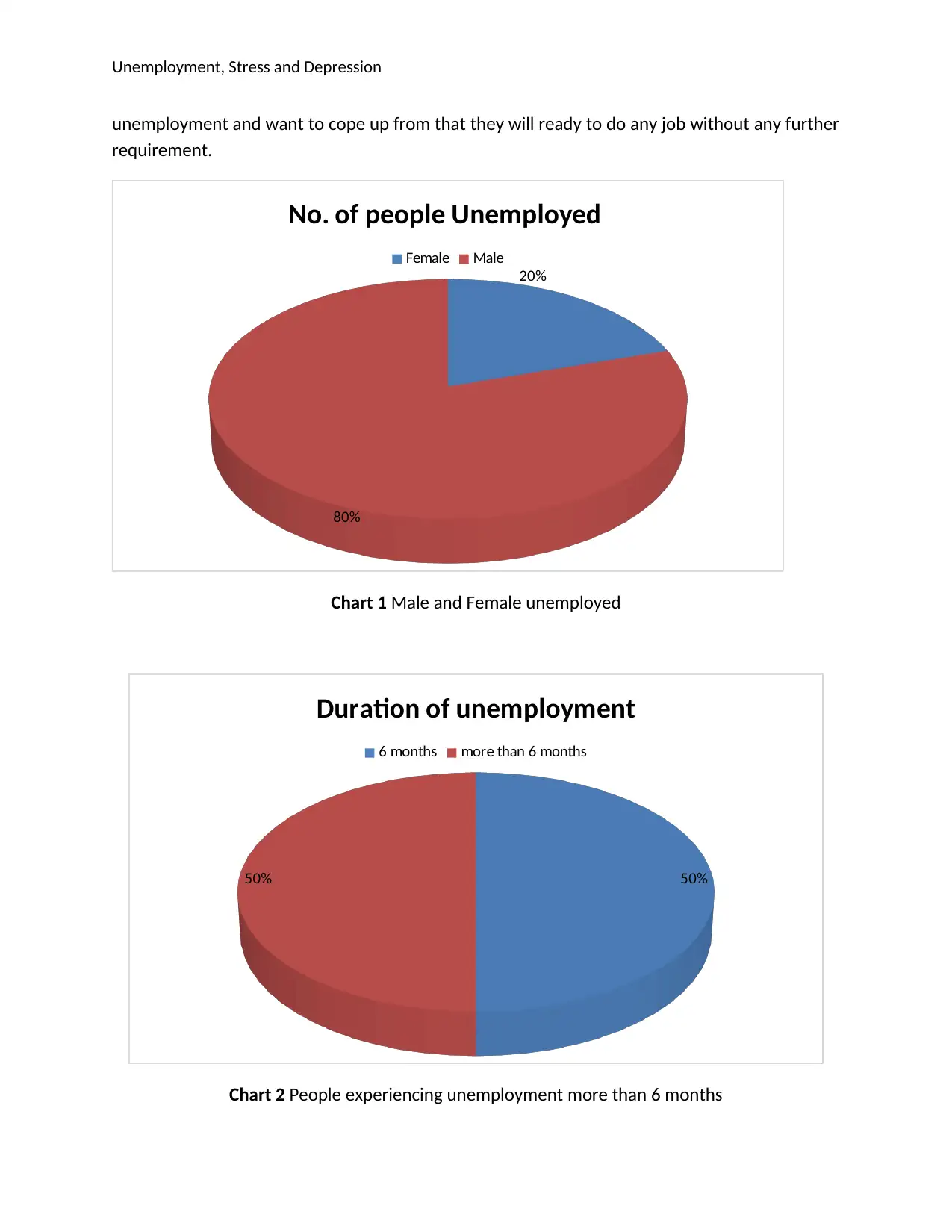
Unemployment, Stress and Depression
unemployment and want to cope up from that they will ready to do any job without any further
requirement.
20%
80%
No. of people Unemployed
Female Male
Chart 1 Male and Female unemployed
50%50%
Duration of unemployment
6 months more than 6 months
Chart 2 People experiencing unemployment more than 6 months
unemployment and want to cope up from that they will ready to do any job without any further
requirement.
20%
80%
No. of people Unemployed
Female Male
Chart 1 Male and Female unemployed
50%50%
Duration of unemployment
6 months more than 6 months
Chart 2 People experiencing unemployment more than 6 months
⊘ This is a preview!⊘
Do you want full access?
Subscribe today to unlock all pages.

Trusted by 1+ million students worldwide
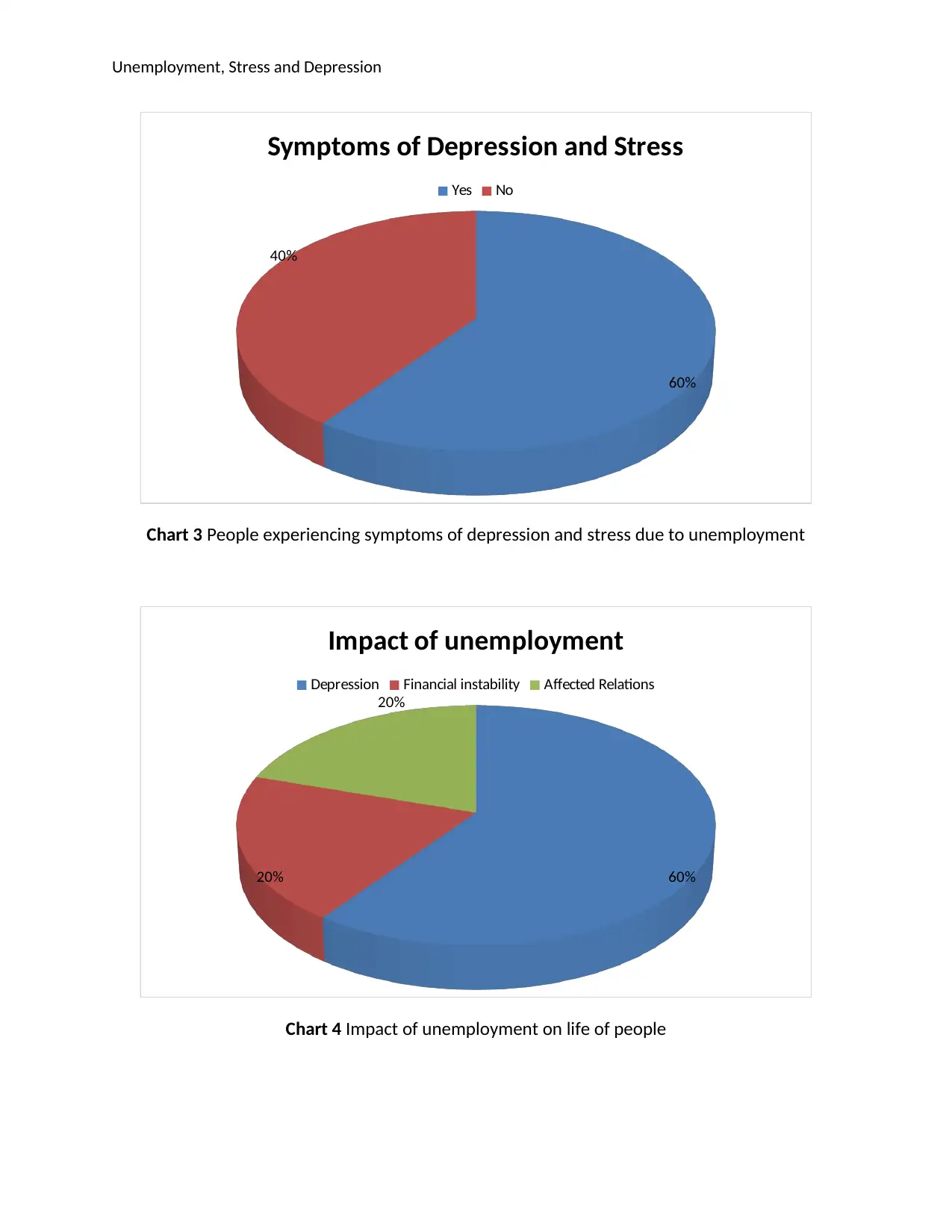
Unemployment, Stress and Depression
60%
40%
Symptoms of Depression and Stress
Yes No
Chart 3 People experiencing symptoms of depression and stress due to unemployment
60%20%
20%
Impact of unemployment
Depression Financial instability Affected Relations
Chart 4 Impact of unemployment on life of people
60%
40%
Symptoms of Depression and Stress
Yes No
Chart 3 People experiencing symptoms of depression and stress due to unemployment
60%20%
20%
Impact of unemployment
Depression Financial instability Affected Relations
Chart 4 Impact of unemployment on life of people
Paraphrase This Document
Need a fresh take? Get an instant paraphrase of this document with our AI Paraphraser
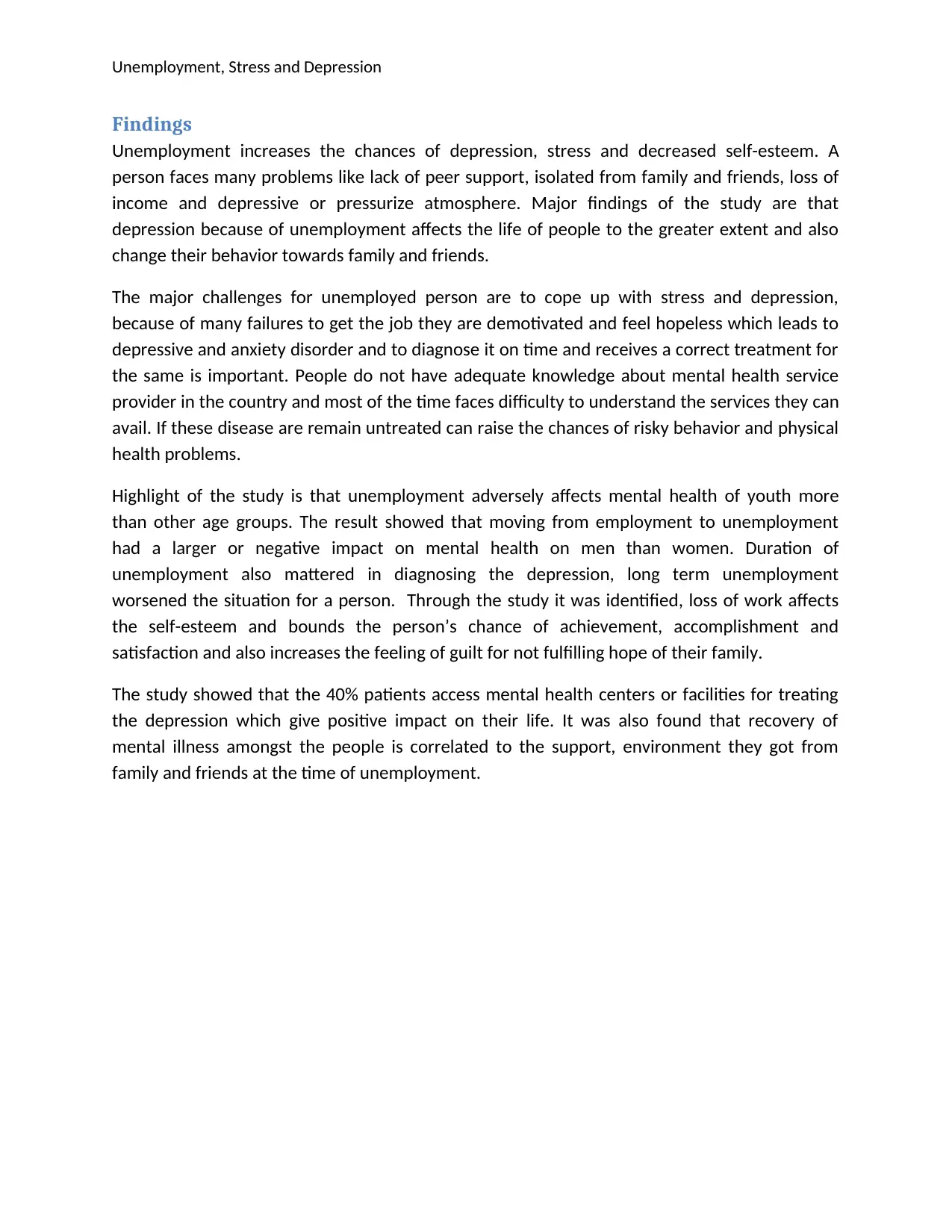
Unemployment, Stress and Depression
Findings
Unemployment increases the chances of depression, stress and decreased self-esteem. A
person faces many problems like lack of peer support, isolated from family and friends, loss of
income and depressive or pressurize atmosphere. Major findings of the study are that
depression because of unemployment affects the life of people to the greater extent and also
change their behavior towards family and friends.
The major challenges for unemployed person are to cope up with stress and depression,
because of many failures to get the job they are demotivated and feel hopeless which leads to
depressive and anxiety disorder and to diagnose it on time and receives a correct treatment for
the same is important. People do not have adequate knowledge about mental health service
provider in the country and most of the time faces difficulty to understand the services they can
avail. If these disease are remain untreated can raise the chances of risky behavior and physical
health problems.
Highlight of the study is that unemployment adversely affects mental health of youth more
than other age groups. The result showed that moving from employment to unemployment
had a larger or negative impact on mental health on men than women. Duration of
unemployment also mattered in diagnosing the depression, long term unemployment
worsened the situation for a person. Through the study it was identified, loss of work affects
the self-esteem and bounds the person’s chance of achievement, accomplishment and
satisfaction and also increases the feeling of guilt for not fulfilling hope of their family.
The study showed that the 40% patients access mental health centers or facilities for treating
the depression which give positive impact on their life. It was also found that recovery of
mental illness amongst the people is correlated to the support, environment they got from
family and friends at the time of unemployment.
Findings
Unemployment increases the chances of depression, stress and decreased self-esteem. A
person faces many problems like lack of peer support, isolated from family and friends, loss of
income and depressive or pressurize atmosphere. Major findings of the study are that
depression because of unemployment affects the life of people to the greater extent and also
change their behavior towards family and friends.
The major challenges for unemployed person are to cope up with stress and depression,
because of many failures to get the job they are demotivated and feel hopeless which leads to
depressive and anxiety disorder and to diagnose it on time and receives a correct treatment for
the same is important. People do not have adequate knowledge about mental health service
provider in the country and most of the time faces difficulty to understand the services they can
avail. If these disease are remain untreated can raise the chances of risky behavior and physical
health problems.
Highlight of the study is that unemployment adversely affects mental health of youth more
than other age groups. The result showed that moving from employment to unemployment
had a larger or negative impact on mental health on men than women. Duration of
unemployment also mattered in diagnosing the depression, long term unemployment
worsened the situation for a person. Through the study it was identified, loss of work affects
the self-esteem and bounds the person’s chance of achievement, accomplishment and
satisfaction and also increases the feeling of guilt for not fulfilling hope of their family.
The study showed that the 40% patients access mental health centers or facilities for treating
the depression which give positive impact on their life. It was also found that recovery of
mental illness amongst the people is correlated to the support, environment they got from
family and friends at the time of unemployment.
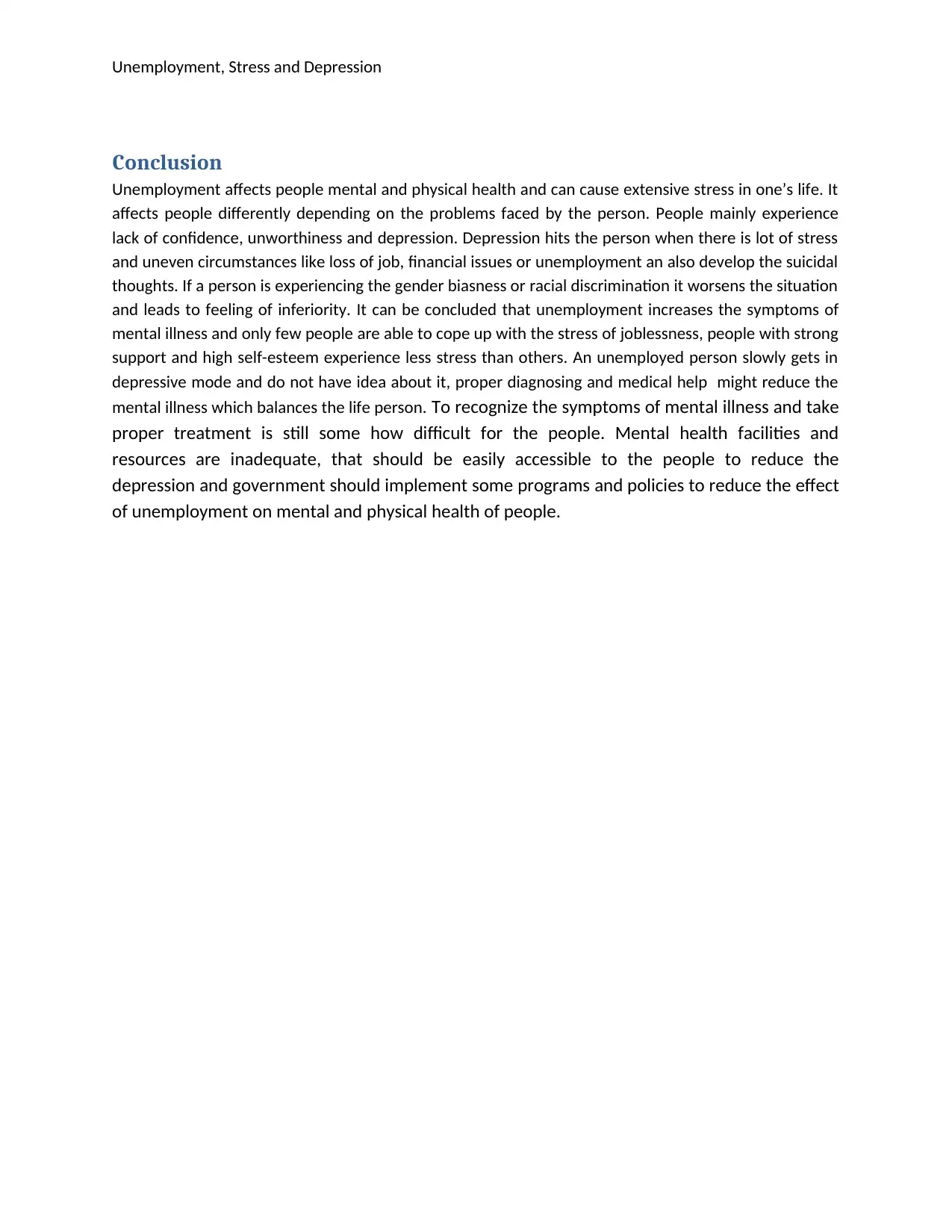
Unemployment, Stress and Depression
Conclusion
Unemployment affects people mental and physical health and can cause extensive stress in one’s life. It
affects people differently depending on the problems faced by the person. People mainly experience
lack of confidence, unworthiness and depression. Depression hits the person when there is lot of stress
and uneven circumstances like loss of job, financial issues or unemployment an also develop the suicidal
thoughts. If a person is experiencing the gender biasness or racial discrimination it worsens the situation
and leads to feeling of inferiority. It can be concluded that unemployment increases the symptoms of
mental illness and only few people are able to cope up with the stress of joblessness, people with strong
support and high self-esteem experience less stress than others. An unemployed person slowly gets in
depressive mode and do not have idea about it, proper diagnosing and medical help might reduce the
mental illness which balances the life person. To recognize the symptoms of mental illness and take
proper treatment is still some how difficult for the people. Mental health facilities and
resources are inadequate, that should be easily accessible to the people to reduce the
depression and government should implement some programs and policies to reduce the effect
of unemployment on mental and physical health of people.
Conclusion
Unemployment affects people mental and physical health and can cause extensive stress in one’s life. It
affects people differently depending on the problems faced by the person. People mainly experience
lack of confidence, unworthiness and depression. Depression hits the person when there is lot of stress
and uneven circumstances like loss of job, financial issues or unemployment an also develop the suicidal
thoughts. If a person is experiencing the gender biasness or racial discrimination it worsens the situation
and leads to feeling of inferiority. It can be concluded that unemployment increases the symptoms of
mental illness and only few people are able to cope up with the stress of joblessness, people with strong
support and high self-esteem experience less stress than others. An unemployed person slowly gets in
depressive mode and do not have idea about it, proper diagnosing and medical help might reduce the
mental illness which balances the life person. To recognize the symptoms of mental illness and take
proper treatment is still some how difficult for the people. Mental health facilities and
resources are inadequate, that should be easily accessible to the people to reduce the
depression and government should implement some programs and policies to reduce the effect
of unemployment on mental and physical health of people.
⊘ This is a preview!⊘
Do you want full access?
Subscribe today to unlock all pages.

Trusted by 1+ million students worldwide
1 out of 14
Related Documents
Your All-in-One AI-Powered Toolkit for Academic Success.
+13062052269
info@desklib.com
Available 24*7 on WhatsApp / Email
![[object Object]](/_next/static/media/star-bottom.7253800d.svg)
Unlock your academic potential
Copyright © 2020–2025 A2Z Services. All Rights Reserved. Developed and managed by ZUCOL.




